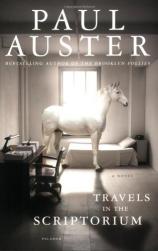Reading Group Guide
Discussion Questions
Travels in the Scriptorium

1. The narrator is watching the events in the room on a hidden camera; the typescript on the table contains a story within the story; the reader is another form of voyeur. How many layers of reality are going on in the novel? Discuss this “Chinese boxes” form of narrative.
2. How does the humiliation Mr. Blank remembers feeling as a young man affect his later life? Is his experience with S. responsible for him “sending people out on missions”?
3. Mr. Blank cannot seem to find the closet, or find out if the door or window is locked. Why is he paralyzed? What is the nature and purpose of his “treatment”? Are Blank’s captors trying to torture him, cure him, or confuse him?
4. Why does Blank experience guilt, particularly when he thinks about James P. Flood? Why is he afraid to read the typescript on the table? What is the source of Blank’s anguish?
5. Who are the people in the photographs on the desk: man sleeping in the park; man propped on a sofa; homeless man; black man with the Warsaw phone book; young man with poker chips?
6. Why does Peter Stillman Jr. ask Mr. Blank to dress all in white? Is he meant to be going to heaven, or to hell? Is he actually dead? If so, how did he die?
7. Anna speaks of Mr. Blank’s “charges” or “operatives,” like David Zimmer, Anna Blume, and Peter Stillman. Explain what she is referring to.
8. Discuss the characters referred to in this novel who may have appeared in the author’s previous works (City of Glass, The Locked Room, In the Country of Last Things, The Book of Illusions, Leviathan, Oracle Night, etc.).
9. Mr. Blank “resigns himself to living in a state of constant uncertainty.” Discuss the idea of ambiguity, chance, impersonation, randomness, and coincidence as themes in this novel and in other works by Auster.
10. What is the “manuscript of lies” referred to in the typescript? Why is Graf given an opportunity to write out his story? Is it as a defense or a confession? What does the Colonel want from Graf?
11. Auster plays with the concept of identity in most of his work. He has referred to the author as a sleuth. Talk about his “quest for identity” as evidenced in the novel.
12. Does Mr. Blank himself become an “operative” in the end? Is that a way for him to reach immortality? What is Blank’s crime? What is his fate and his punishment? Is it the “justice and compassion” referred to in the book?
Travels in the Scriptorium
- Publication Date: December 26, 2007
- Genres: Fiction
- Paperback: 160 pages
- Publisher: Picador
- ISBN-10: 0312426291
- ISBN-13: 9780312426293







